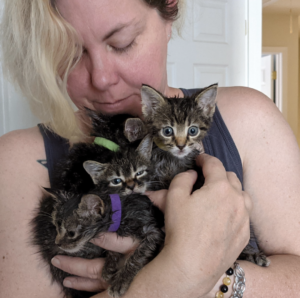
By Theresa Wild
In older generations, the progression of life events was simple: complete school, get married, have children, and live happily ever after. In more recent years, these events happen in different orders, or certain events are skipped altogether. Within this evolution, a common occurrence you can see in adults now is not having children; instead, pets take the place of that role.
There are several reasons for individuals or couples to opt out of having children. Could it be the financial strain that raising children can have on generations that have already struggled through recessions and student loan debt? Or is it due to the personal freedom one has when having pets vs. children? Or maybe it is because they simply do not want to spend their lives caring for children, instead, they may want to spend that time dedicated to their careers, traveling, or living life for themselves.
Whatever their reason may be, the world is seeing an increase in adults seeking other adventures in life outside of parenting children. However, is there still a desire to fill the role of having something to love and care for, while receiving the most unique type of love from a companion animal? According to two different couples who have both fostered for Humane Society of Loudoun County (HSLC), this is the exact path they have taken and it seems to have worked out perfectly for them.
Andi and BJ
Andi (52) and BJ (42) have been known as a couple who falls in love with the “broken” cats. They foster cats, more specifically ferals that need to be socialized, medical cases that need more specialized care and knowledge, and kittens that could require weeks of bottle feeding. They describe themselves as the crazy cat couple and their house has been deemed “the cat house” on their block. They have taken in cats that were labeled as unsocial, to the extent that the agencies worried about ever finding them a home. With their love and support, some of these “unsocial” cats can now be found on their harness at the local brewery with their mom and dad.
“Mystic was a medical foster – a community cat that had been seriously injured and they had no idea how he was going to handle being indoors with people or being medicated. Turns out, he’s amazing and magical. He is EXTREMELY social, has been clicker and harness trained, formally works as a therapy pet, and helps us raise and socialize orphan kittens.” – Andi & BJ
When I asked Andi & BJ if they ever had plans to have children, their answer was simple: “no and no.” Based on their hobbies alone, it would appear that they enjoy their freedom. They are gamers, brewers, and fans of Star Wars and other sci-fi fantasies.
In their own words, they are “proud nerds.” BJ plays guitar and bass and has been in a few bands, while Andi is a competitive pole dancer. It’s not that Andi and BJ don’t love kids, they have just chosen not to have their own. With 7 cats to care for and their busy social lives, Andi and BJ seem to have a wonderful balance.
Marshal and David
The same can be said for another couple that I spoke to, Marshal (34) and David (37). David is a children’s librarian and has made it his life work to bring stories to life for little ones. Although they don’t foresee children as a part of their future, they enjoy watching their friends’ children grow up.
Even though Marshal and David have chosen not to have children, Oscar Trotsky, their 4-year-old cat, has similar behaviors to what can be found in having a child. Oscar could be categorized as a “foster fail” (or “foster win”, depending on your perspective), after living with them for 3 months as a foster cat and then becoming a part of their forever family. Oscar can often be found napping on Marshal and David’s legs, devouring his wet food, and making occasional Zoom cameos when Marshal works from home.
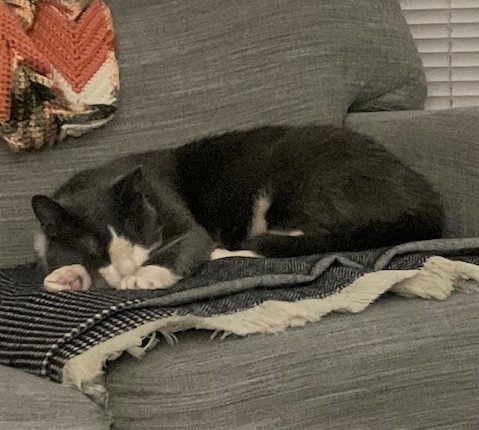
Oscar Enjoying a Good Nap
Although Oscar Trotsky was given his name due to Marshal and David’s love for political science, in their home, he is referred to as “the baby.” In casual conversations, you can hear them ask each other “Did you feed the baby yet?”
Even though they compare Oscar to a baby, they know it is not the same thing. The couple acknowledges that “while both of us know that caring for children takes immeasurably more time and effort (no one puts a bowl of kibble down for their toddler and then walks out the door for a few hours) we do make decisions about the care of Oscar jointly. And while we do not consider him our child, he is one of the highest priorities in our shared lives.”
“Just Do It!”
Both couples have similar paths of not having children, but dedicating their lives to loving their pets unconditionally. If you ask either couple, they have the same advice for anyone considering adding a furry “child” to their lives: “Just do it!” According to David and Marshal, “Pets allow us to express love, and any time we have the opportunity and ability to share love, I believe it makes the world a better place.”
Whether you are considering children, one pet, or even seven, the love of an animal is endless. If you are on the fence about adding a child or a pet to your life – that’s ok! Andi and BJ said it best: “Your local rescue, and of course HSLC, will have the right companion animal for your lifestyle.” Reach out and see what is out there for you. Who knows, you may find your forever baby as well.
By Kathleen Silver
“Community Cats” is a term used to describe outdoor, unowned, free-roaming cats. In this article, you’ll learn why running the HSLC Community Cats program takes a dedicated village of everyday heroes. But first, let’s dispel a few of the misconceptions about community cats and then introduce you to one of those heroes.
“Outdoor cats live horrible lives!”
Accidents, abuse, and disease affect outdoor cats living alone or in groups. But, feral cats are generally not adoptable and simply cannot live inside. HSLC’s Community Cats program improves the lives of these cats in so many ways through trap, neuter, and return (TNR). TNR also serves to humanely stabilize cat populations. In addition, HSLC community cat caretakers ensure that the cat colonies in our care are fed and watered every day; plus they keep an eye out for any health issues.
“I need special skills to help trap cats.”
Volunteers who help manage feral cat communities are genuinely silent heroes. But, they don’t require special skills. Rather, they simply need to be patient and dedicated. It also helps if the volunteers appreciate the outdoors regardless of the season.
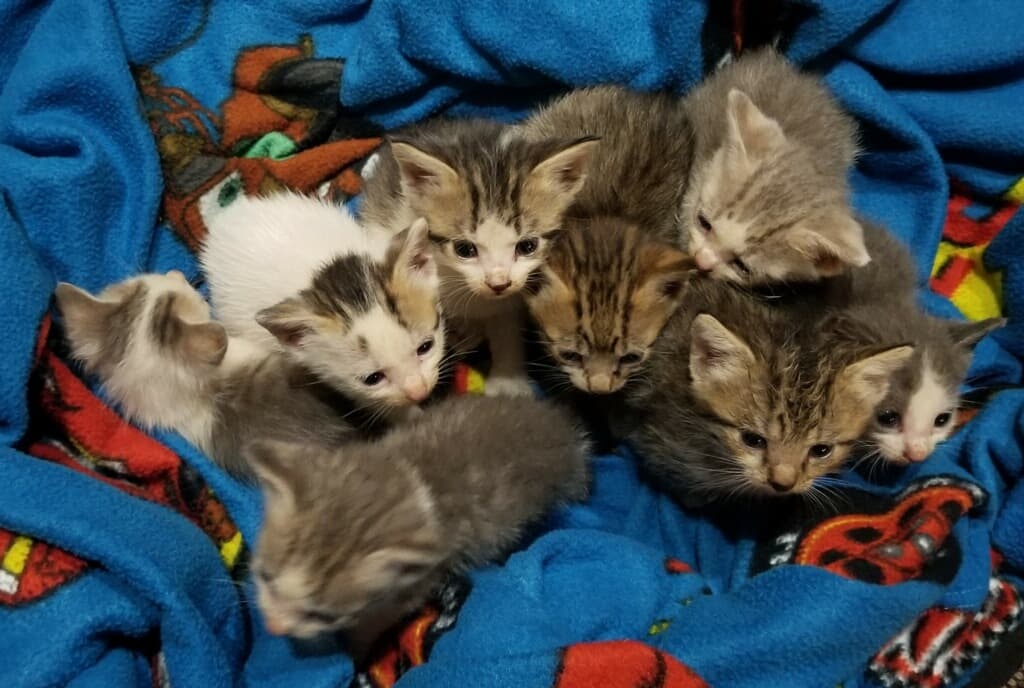
“Born a feral cat, always a feral cat.”
While this is usually true of adult feral cats, it is not necessarily true of kittens. Once a feral cat gives birth, the kittens can usually be socialized and adopted through normal means. There are anecdotal stories of adult cats becoming socialized. But, in most cases, these cats had been socialized before their outdoor life.
Everyday Hero: Dora Lea
Dora Lea Spring-Lucas is one of our Community Cat heroes; in fact, she’s a seasoned veteran. She can attest to the benefits of these bonded cat communities with nearly 30 years of experience helping feral cats. Volunteers like Dora Lea, help to manage over 20 community cat sites in Loudoun County.
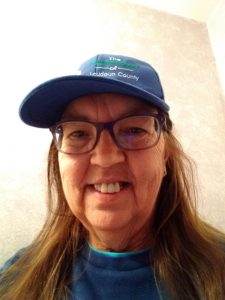
When asked what her biggest challenge is, Dora Lea didn’t have to consider the question too long. “People dropping tame (domesticated) cats. I do feel for people who might be embarrassed about surrendering their cats directly to the Humane Society, but they shouldn’t feel that way. For us to contain these feral colonies, we need to keep the populations down.” If you, or someone you know, adopted from HSLC and are considering surrendering your animal, please contact us at helpanimals@humaneloudoun.org.
Two Ways You Can Help
Community Cat Caretaker looks after a feral cat colony’s health and well-being regularly (e.g. each Monday). The caretaker provides cat food and water and notifies the lead volunteer when a cat is sick. HSLC provides on-site training. If you have an eye for detail, this could be the role for you.
Trapper: Trappers help community cats by catching them in humane traps (provided by HSLC) and helping to get them to our vet partners to be neutered, vaccinated, and microchipped. We provide on-the-job training and shadowing until new trappers are comfortable working independently. Most trappers work in pairs or groups.
Committing to volunteer as a trapper can be time-consuming as there is a lot of waiting around for timid cats and kittens to walk into traps. But, Dora Lea says the satisfaction and reward can be significant. Every trap that closes contains a life filled with less stress, disease, and abuse.
Apply to be an everyday hero today!
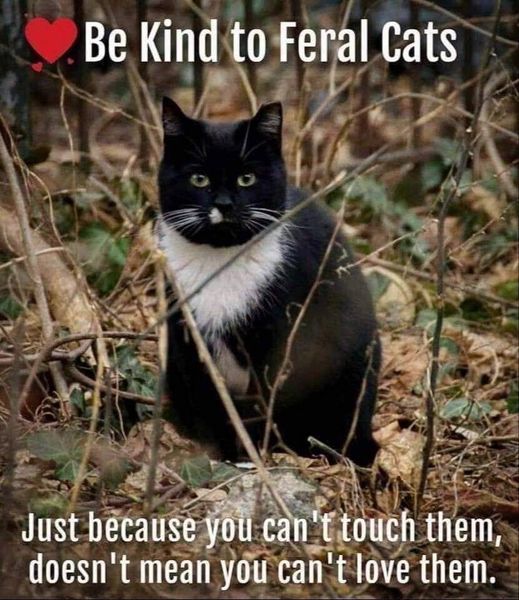
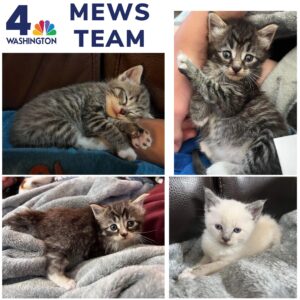
The Humane Society of Loudoun County is hosting an online “Christmas in July” auction to raise money for at-risk animals in the community. News4’s Molette Green shares how you can help. Watch video.
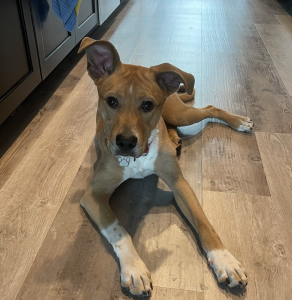
By: Heather Nokes
To foster is to save a life. Foster parents are in charge of the day-to-day care of their foster animal. They teach them what it means to be loved and prepare them to be adopted by their forever family.
The Humane Society of Loudoun County took in a dog named, Ulysses, who had been transported from Roanoke, VA. Without the help of HSLC and his foster, Sarah, Ulysses may not have gotten the freedom ide he deserved and a second chance at life. Sarah is a new foster for HSLC and gave us a first-hand account of her journey as Ulysses’ foster mom.
How did you hear about HSLC?
“I heard about HSLC when I was searching for volunteer opportunities. I have been around animals my whole life and wanted to reduce the number of animals being euthanized. Specifically, I was looking for an organization close by that I could be a part of. ”
What made you want to foster?
“I wanted to be an active part of helping at-risk dogs and cats. They often come from a stressful environment and need a quiet place to unwind and learn how to be a [companion animal]. They may have been homeless and shuffled around for a long time, and many of them are scared. By fostering, I am being understanding of the [animal’s] previous situation and helping them trust again so they can be successful in a forever home.”
Was it easy to sign up as a Foster with HSLC?
“It was very easy to sign up. I provided references and they did a simple interview and (virtual) home visit with me. For someone experienced with animals, it’s an easy process. HSLC gives plenty of resources and shares vast knowledge with new fosters to help them be successful.”

Tell us about Ulysses!
“Ulysses is a sweet, happy-go-lucky hound mix who adores everyone he meets. He followed me everywhere around the house and yard, loving every bit of attention. As a young dog, he enjoyed the large yard and regular exercise we were able to provide. He also loves to snuggle at the end of the day in bed. He was perfect for watching movies with!”
What was your favorite part about fostering?
“My favorite part of fostering is definitely the bond we create with the animals. They truly appreciate us giving them good food, water, and a soft place to rest their heads. I also really enjoy training them with lots of good treats. Ulysses especially loved when I’d train him using peanut butter as the reward!”
What was your least favorite part?
“My least favorite part is probably the goodbye. You get attached to foster animals, so it is bittersweet when they go to a good home. But, I would definitely foster again! I plan to, for both cats and dogs.”
Is there anything else you would want potential fosters to know?
“One thing I’d want fosters to know is that it takes time for [an animal] to become acclimated in their home. They may cry at night or be shy for the first few days or even weeks. It takes patience to help them adjust to a new lifestyle, but it is so rewarding.”
It is because of Sarah that Ulysses got a happy ending and was adopted! The Humane Society of Loudoun County does not have a facility to house animals and solely relies on its network of caring fosters. If you are thinking of becoming a foster with HSLC or have questions about fostering, you can use this link: https://humaneloudoun.org/programs/foster/ or email foster@humaneloudoun.org.

By Kathleen Silver
When adopting animals with special needs, our hearts go out to those with obvious physical issues. But, there are also conditions we cannot see, and one of those is Feline Immunodeficiency Virus (FIV). Similar to HIV in humans, FIV can weaken a cat’s immune system making them more vulnerable to other infections.
In North America, 3-5% of cats test positive for FIV. And, like humans, a stigma carries over to FIV+ cats based on misinformation. So, allow us to take a few minutes of your time to bust some of the common myths about FIV and share a couple of positive stories about these special cats.
MYTH #1 – FIV is a death sentence.
Studies in both 2010 and 2022 note that cats with FIV live an average lifespan that is about equal to any indoor cat WITHOUT FIV. Moreover, they can live their entire lives without ever showing symptoms of FIV.
As with any animal, proper care is essential. Cats with FIV should exercise, be fed a proper diet, and visit the veterinarian every six months to stay on top of possible symptoms. FIV+ cats must always be kept indoors to protect other cats and shield FIV+ cats from infectious diseases they might pick up outside.
Some vet offices recommend euthanasia for an FIV+ cat even if the cat is otherwise healthy. However, this is not in accordance with the American Association of Feline Practitioners’ guidelines. If this is your vet’s recommendation, it may make sense to get a second opinion.
MYTH #2 – FIV+ Cats can’t live with other animals.
The primary mode of transmission for FIV is through bite wounds from an infected cat. Households where all cats are fixed, remain indoors, and live peacefully pose little risk of FIV transmission.
Case in point: After doing her research, HSLC volunteer, Eryn M., adopted Sampson — a happy, talkative kitty– into a home with three other cats. “Sammy” loves food, playing with toys and getting attention just like any other kitty. He’s asymptomatic and has been his entire life. Thanks to a proper introduction and vigilant care, no other animal in Eryn’s household was infected with FIV.
It should be noted that FIV can not be transmitted to humans or other animals besides cats.
MYTH #3 – FIV cats have a lower quality of life.
This could not be further from the truth. FIV is an incredibly slow virus – it can take years before it has an impact, if any at all. With a good diet, safe and caring environment, regular vet checks and an indoor-only lifestyle, an FIV cat can live a normal life.
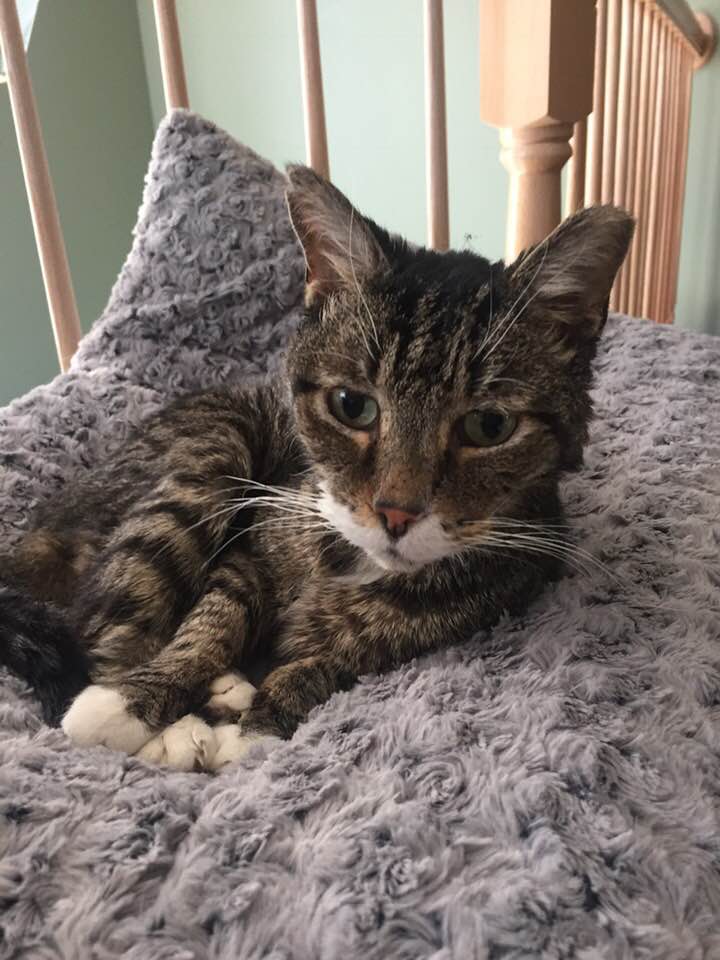
Case in point, Anne S., president of the HSLC board, found a senior “kitizen” who was FIV+ on her street. Likely dumped, Mr. F.C. was in bad shape. He was overweight (“FC” originally stood for “Fat Cat”), covered with mats and had a laceration on his neck. So, when Anne and her husband took Mr. F.C. in, they didn’t expect him to survive much longer. But this tough kitty defied expectations and lived another 4 years before being diagnosed with cancer. Anne refers to Mr. F.C. as her spirit animal and is so thankful for the time they had together.
To learn more about FIV, click here.

By Amy Richards
Fostering kittens is an investment.
First and foremost, it is an emotional investment. No one can take in an animal, even a healthy and well-adjusted one, and not get somewhat attached. And, then there is the time investment — from learning how to bottle-feed and dispense medication to socializing the little ones to get them ready for adoption.
But, one of the biggest hurdles rescue organizations face in attracting kitten fosters is the financial investment that is sometimes required of the foster parents themselves. Vet care is traditionally covered and some of the basics may be as well. But there’s always food, litter, toys, supplies, etc. that aren’t always provided as rescues spread out their limited resources across various programs. And, newborn kittens, in particular, need many essential items to keep them safe and secure as they grow into healthy young kittens.
What kittens need
What a kitten needs depends on how tiny they are and where they came from. If they don’t have a mother then they need something to keep them warm until they are approximately four weeks old. A SnuggleSafe (microwavable disc) or pet-safe heating pad are ideal. Regular heating pads can overheat the kittens and don’t work well for transporting them. If they don’t have a momma, a Snuggle Kitty plush works as a soothing stand-in and even has a battery operated heart to make them feel safe in “her” care. They also need soft, snuggly blankets to cover the heat sources and make them cozy and comfortable.
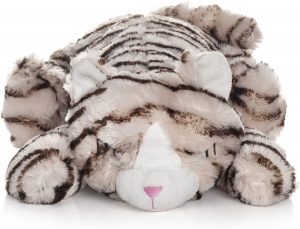
If the animals are dirty or infested with fleas, they will need a bath with kitten safe soap. Either Original Dawn dish soap or Johnson’s Baby Shampoo are preferred. They are gentle enough for use with kittens but will help get rid of any parasites that are bugging them. After bath time, they need to dry off, ideally with cotton washcloths. And for potty time and spot clean ups, fragrance-free baby wipes do the trick.
Now we can discuss the all important mealtime. Kittens can’t drink regular milk; they need Kitten Milk Replacement Formula. The two most commonly used brands are KMR by PegAG and Breeder’s Edge Foster Care. KMR requires refrigeration after opening the container whereas Breeder’s Edge is more shelf-stable. And, just like bottle-fed human babies, they need plenty of bottles and nipples. Miracle Nipples are recommended as they are generally safer and help reduce the chances of a kitten getting formula in their lungs. They also stand up better to wear and tear reducing the chances of a kitten biting a piece of the nipple and swallowing it.
How you can help
You can see how the costs of fostering quickly add up. So, to help reduce the financial burden on our wonderful fosters, HSLC created a Kitten Registry on Amazon.com. If you are able, please visit the registry today and select an item or two. Before checking out, make sure the shipping address is “Amy Richard’s Gift Registry Address”. Because HSLC is a foster-based non-profit organization with no physical shelter, I collect items for the foster caregivers and distribute them from my home.
Thank you for playing a pivotal role in saving the tiniest of lives in our community!
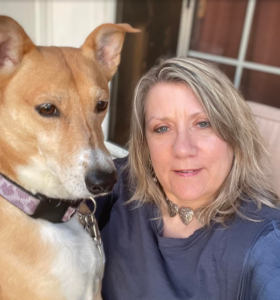
Lisa is an unsung hero. She never draws attention to herself for her consistent and impactful contribution. As a regular event volunteer, she can be relied on to show up ready to play each and every time. Her positivity and desire to help advance the HSLC mission really shine through when interacting with the public. Lisa is also a reliable cat condo volunteer who takes special care of the cats and kitties at the Leesburg Petco on a weekly basis. Lisa is a model volunteer who deserves her day in the sun!

Sarah started as an adoption counselor and transitioned easily into the role of Adoption Coordinator when the previous coordinator stepped down. She came in with great ideas, new energy, and an eagerness to help in any way. Despite her busy work and schedules, she consistently answers all emails promptly and is an excellent communicator. Sarah has a positive attitude and just wants to help get animals adopted. She has also stepped up to help in some difficult situations. She is an absolutely amazing volunteer.

Earlier this year, the Humane Society of Loudoun County (HSLC) launched ShelterLuv thanks to the leadership of Animal Care Director, Amy Richards. We sat down with Amy to learn more about this exciting tool and how it will help HSLC keep up with the evolving needs of the community.
There is a lot of excitement surrounding the launch of ShelterLuv. What is It, and how will it benefit HSLC?
Shelterluv is a budget-friendly software program developed specifically for animal welfare organizations to help manage everything from the intake of an animal, storage of medical records, to processing adoptions.
That sounds very useful! How will it help our volunteers, fosters and adopters?
Shelterluv will hold all of the information on each animal making it easier for any volunteer to see what medical care an animal has received, when they are due for their next vaccinations, and if they are ready for adoption. Additionally, we can build profiles for each of our foster guardians to include how many animals they are comfortable with, preferred age, if they are comfortable caring for animals with special needs, and more. Each foster guardian is invited to update their profile and can also enter their availability.
There will also be an enormous benefit for our adoptions team and adopters. The team will be able to process adoptions completely online since adopters will be able to sign the adoption agreement and pay the adoption fees right from their mobile devices. Adopters will also get special offers on pet insurance from MetLife, discounts from Chewy, and an Adopterluv account with our digital adoption packet and all of their new companion animal’s medical information.
So it’s win-win-win for the humans! Are there any benefits to the animals?
The benefits to the animals come from the automation of the system. It enables our Animal Care Team to have better visibility into each of the cat or dog’s needs, reminders of vet appointments due, and access to their records. Perhaps one of the biggest benefits to the animals is that Shelterluv makes it easier to request and collect additional donations with the mobile checkout feature.

As the project lead, what did you learn during the on-boarding process that you can use going forward?
In some cases it was like learning an entirely new language. I don’t come from the tech world, so I had a lot of questions. ShelterLuv’s onboarding team is so helpful. They really held my hand and explained things as we went along, answering the questions I had about the software and terminology. This has expanded my knowledge base and will be helpful when training my teammates on the system and when working with other shelters/rescues.
Sounds like this project was out of your comfort zone but you went for it anyway. What advice would you give someone who wants to take on an important initiative even though it may be outside their wheelhouse?
Oh definitely. I would suggest for anyone to make sure they have the time and support needed for a project like this. Don’t be afraid to ask for help from the company you are working with on things you don’t understand. Be clear in your communication with your team including responsibilities and due dates. If you are only looking for feedback, make sure to be specific on what type of feedback you are looking for and from whom. And finally, be patient with yourself, and give yourself and others the grace and space to learn.
Now that the dust has settled, how are you feeling about ShelterLuv?
Really happy and proud. The adoption process is so much easier. We have some volunteers who are now more involved and invested. We can see how much it has to offer and we continue to learn exciting new things every day!
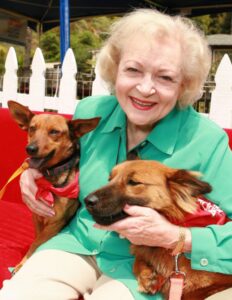
By Kathleen Silver
Many of you are likely aware that the world lost a shining star on New Year’s Eve 2021: Ms. Betty White. A well-known actress, comedian, and producer; Ms. White left her mark on the world. She passed away peacefully at the age of 99. A life well-lived, Betty White was a pioneer of early television in the 1950s and continued to act in shows well past her 90th birthday. This month, we would like to honor how she used her fame to help animals.
Improving Zoo Life
Throughout her life, Ms. White owned many dogs and cats. Her love, however, didn’t stop with her own companion animals. She served on the Los Angeles Zoo’s board for over 50 years, advocating and raising funds for state-of-the-art gorilla and orangutan exhibits for all to enjoy. Betty told AARP Magazine: “I got involved with the Los Angeles Zoo because I was kind of shocked that Los Angeles had such a poor zoo inside. I’ve never been one to stand around and criticize. I’d rather get inside and see what’s going on, see how I can help.” In 2012, Betty spent her 90th birthday at the zoo.
Leveraging TV to Help Animals
Her passion for animals crossed with her on-screen work in 1971 when she produced and hosted a show called Pet Set. The show featured both wild animals and her celebrity friends’ pets, including movie star Doris Day and game show host Bob Barker. Throughout the series, Betty White made it a point to discuss home pet care with her costars and invited animal experts to discuss wildlife preservation.
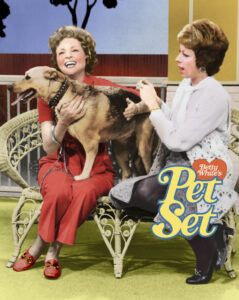
She also wrote several books and hosted more television specials like Hero Dog Awards, Big Cat Week, and Betty Goes Wild. Betty White even starred as a returning character on the popular animated series Pound Puppies as “Agatha McLeish” in 2010.
In 2009, Betty White told TV Guide, “I’m the luckiest person in the world — my life splits in absolute half: half animals, half show business.”
Working with Foundations
From 1971 to 2013, Ms. White worked with the Morris Animal Foundation. This foundation supports research and development of vaccines, surgical techniques and technologies, and other medications to revolutionize the world of animal healthcare. She served as the foundation’s president emeritus while it developed the groundbreaking feline leukemia and Potomac horse vaccines.
In response to the Deepwater Horizon oil spill in 2010, she provided the donation that established the Betty White Wildlife Fund and sponsored over 30 animal health studies on behalf of the organization. This fund still exists at the Morris Animal Foundation as the threat to wild species continues.
Leaving a Legacy
Betty White’s recent shining achievement came after her death. Her fans took to social media to ask animal lovers to give back in honor of Betty White’s outstanding dedication to animal activism. Called the “Betty White Challenge,” — the event went viral. Leading up to and culminating on January 17th, what would have been Betty’s 100th birthday, the #BettyWhiteChallenge raised a whopping $12.7 million worldwide! We are so thankful that many folks, including numerous new supporters, decided to honor Betty White’s legacy by donating to the Humane Society of Loudoun County.
This year, the #BettyWhiteChallenge lives on! Please visit our donation page to make a donation in memory of Ms. White to help the at-risk and homeless animals in our community. Thank you!
